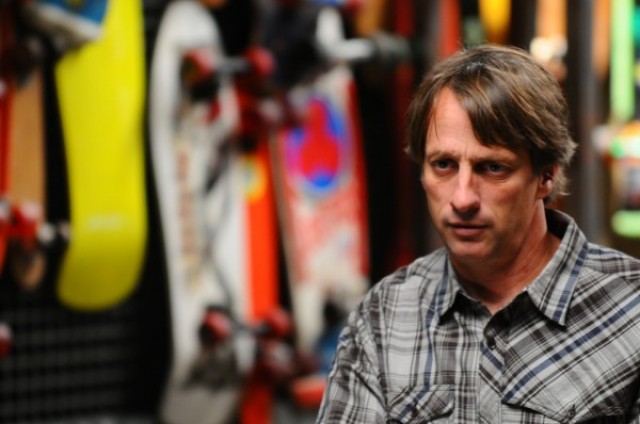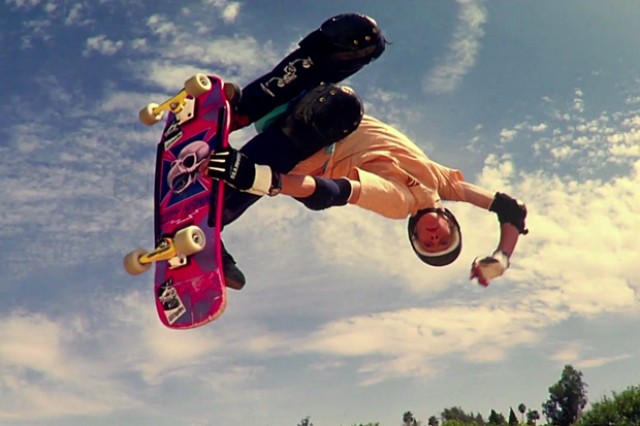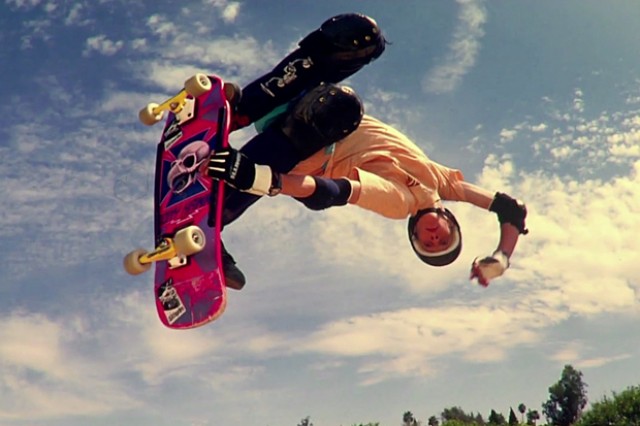BONES BRIGADE: AN AUTOBIOGRAPHY (Stacy Peralta, 2011)
IFC Center
323 Sixth Ave. at West Third St.
Through Thursday, November 8
212-924-7771
www.bonesbrigade.com
www.ifccenter.com
Tony Hawk was nine years old when he first got on a skateboard; by the time he was twelve, he was skating competitively, taking off on a remarkable career in which he would win seventy-three events by the time he was twenty-five, then go on to capture fourteen X Games medals, including nine gold. Born and raised in California, Hawk was a key member of the Bones Brigade, a group of young skaters, including Mike McGill, Lance Mountain, Rodney Mullen, Steve Caballero, and Tommy Guerrero, who revolutionized the sport, coached by former skater and videographer Stacy Peralta (Dogtown and Z-Boys, Riding Giants), who documents the history of the team in Bones Brigade: An Autobiography. (The film is playing at the IFC Center through November 8 and is also being released today, November 6, on DVD and as a digital download.)
Now forty-three, Hawk is still one of the leading proponents of skating, through popular video games, tireless personal appearances, and the Tony Hawk Foundation, which builds public skateboard parks in low-income communities. The thrice-divorced Hawk has four children, including nineteen-year-old Riley, who is a sponsored skater himself; his other boys, Spencer, thirteen, and Keegan, eleven, skate leisurely. He also has a four-year-old daughter, Kadence Clover. Hawk continues to thrive in the spotlight; he recently even ate bugs with fellow skater Jason Ellis for a Ride Channel video. Hawk called in from his home in San Diego late last week to talk about the new documentary, making the cult classic The Search for Animal Chin, and eating crickets.
twi-ny: Several guys in Bones Brigade get teary-eyed near the end. What kind of emotions did you experience while looking back at this seminal period of your life?
Tony Hawk: My experience was a little bit different in terms of what affected me so deeply. I love that I was part of that group, but I knew that there was more that I wanted to do, not necessarily being a pro skater but promoting skating and possibly doing my own company as well. I don’t look at my days there as a springboard by any means, but I’ve been through so much since then, you know, in terms of the industry and success, so for me it was more my heartfelt emotions about what Stacy taught me in terms of handling myself and achieving and helping riders. What I took away from that time was that there’s such a good way to approach this as a career and to be a mentor to others by doing so. Stacy left before I left, and that’s when it became clear to me that I’ve got to go do something else.
twi-ny: Like the Tony Hawk Foundation.
Tony Hawk: That’s not something I had in mind back then. It’s just something that evolved with the success and with skating’s popularity.
twi-ny: Something the movie makes clear is how much you all wanted to make Stacy happy. Is there a difference between Stacy the coach and Stacy the director?
Tony Hawk: Well, I think the respect that he has for the subject and for the riders is absolutely the same. I mean, he’s not out to make some propaganda or some insulting piece about the people that he’s highlighting. You can see him as the director working differently just because in the back of his mind he knows the thread of the story. In coaching, he was trying to empower us. In his coaching, he’s just very encouraging in all aspects just so that you become the skater you want to be, not that he’s trying to direct that at all.
twi-ny: You guys made a lot of videos back then, but what was it like revisiting The Search for Animal Chin? Had you seen it recently?
Tony Hawk: I’ve seen parts of it. I haven’t watched the whole thing in a long time.
twi-ny: It’s kind of wild to watch today.
Tony Hawk: It was very fun in the beginning, but then the weeks went by and we had to do the sort of acting thing. We just wanted to do the skating, so there definitely was some tension among the team and between Stacy because it was, like, “Why are we doing this lame thing?”, like, this scene, and trying to act, and all we want to do is go skate. I mean, we thought it was a funny idea, but for us, the skating was more the priority.
twi-ny: There are a lot of personal revelations made in the film. Was there anything you learned that particularly surprised you?
Tony Hawk: I think, probably, about Rodney, that his home life was not ideal. I knew of his intense focus and dedication to skating, but I didn’t know how truly volatile it was, that he was at risk of being forced to quit so many times.
twi-ny: His story is probably the most powerful one in the film. Did he always gesture and talk in those roundabout, philosophical ways?
Tony Hawk: It used to be worse. I don’t know how to explain it. Communicating with Rodney used to be much different. If he didn’t know you, it was very hard to break through and understand him.
twi-ny: A few years ago, Spike Jonze’s skate videos were shown at MoMA, taking them to a whole new level, and now we have channels like Ride. How do you think things might have been different if there was a YouTube back in the ’80s?
Tony Hawk: It would have progressed faster, the information would have spread more immediately, and possibly it would have meant more global recognition.
twi-ny: Well, through the internet and the X Games, for example, you’re now heroes to new generations.
Tony Hawk: In the past, the only people who really appreciated skating were the ones who did it, and the X Games created a fan base of people who enjoyed it and came to understand it and appreciate it but didn’t necessarily want to do it themselves. I think that’s when we broke through a ceiling of popularity and established skating as something that was here to stay.
twi-ny: What do crickets taste like?
Tony Hawk: [laughs] They’re not bad. There’s a part two to that video where we eat scorpions and silkworms. Silkworms taste like dirt.



 Back in the late 1970s and early 1980s, as skateboarding began to take off on the West Coast, one group of kids became the face of the growing movement. Sponsored by the Powell Peralta company founded by skateboard engineer George Powell and skater Stacy Peralta, the Bones Brigade was led by the core team of
Back in the late 1970s and early 1980s, as skateboarding began to take off on the West Coast, one group of kids became the face of the growing movement. Sponsored by the Powell Peralta company founded by skateboard engineer George Powell and skater Stacy Peralta, the Bones Brigade was led by the core team of